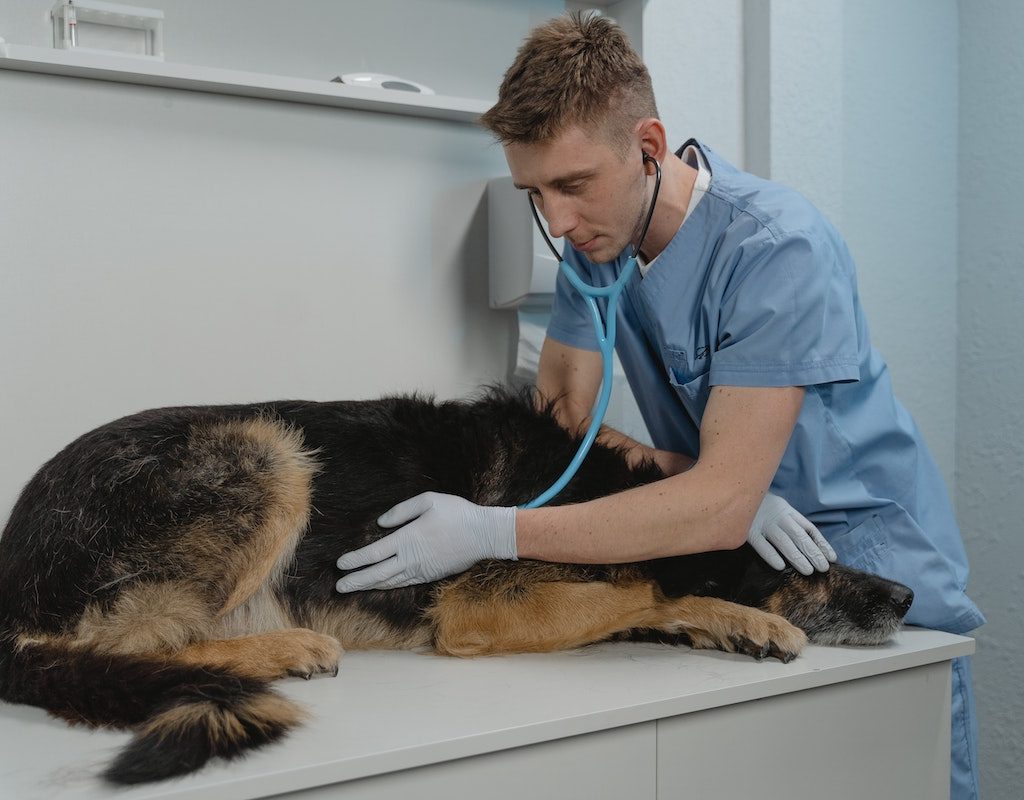
If you’re like most pet parents, the sight of your beloved dog throwing up sends shivers of fear down your spine. Just like us, dogs occasionally eat something that disagrees with them and causes them to vomit. In most cases, your dog’s vomiting will resolve on its own, but if your pup keeps throwing up, it could be cause for concern.
We’ll give you the rundown on everything you need to know about why your dog keeps throwing up, from potential reasons why your pet might be vomiting to when you should take your pooch to the vet.

When should I be concerned if my dog keeps throwing up?
The first thing you have to do is differentiate between vomiting and regurgitation. According to BluePearl Specialty and Emergency Pet Hospital, vomiting requires effort, while regurgitation involves no visible effort when your pup brings up their stomach contents. Once you’ve determined that your dog is vomiting, it’s time to rule out common causes.
Some dogs enjoy snacking on grass, which can make them puke. It’s also possible for your dog to throw up after eating his dinner too quickly or eating something he shouldn’t have. If your dog vomits multiple times a day — or for several days in a row — it’s time for a trip to the vet to rule out a potentially dangerous health issue. Additionally, you should take your dog to the vet right away if his vomiting is accompanied by one or more of the following symptoms:
- Vomiting blood
- Bloody stool
- Diarrhea
- Fever
- Weight loss
- Lethargy
- Retching without producing vomit
- Seizures
Prompt veterinary assistance is also required if you suspect that your dog has eaten a foreign object or ingested human medication or chemicals, such as antifreeze or household cleaners.

How do I stop my dog from throwing up?
According to VetWest, vomiting “is a forceful ejection of the stomach and upper intestine contents.” Your dog’s vomiting could be caused by gastritis (often a result of eating spoiled food or garbage), eating too quickly, becoming too active immediately after eating, or ingesting a substance that causes stomach upset. Unfortunately, vomiting can also be a symptom of infectious diseases, such as coronavirus, distemper, and parvovirus. Vomiting might also indicate that your pup has pancreatitis, diabetes, kidney disease, liver disease, or cancer.
It won’t necessarily be possible to prevent your dog from throwing up altogether, but you can slow it down by putting your dog on a 12-24 hour food fast. (Just make sure he has plenty of fresh water to drink so he stays hydrated.) As tempting as it sounds, never give your dog Pepto-Bismol without consulting your veterinarian, as it can cause your dog’s stool to change color. Pepto-Bismol also looks opaque on X-rays, making it impossible for your vet to discern if your dog has ingested a foreign object. If you suspect your dog is throwing up because he eats too quickly, try feeding him smaller portions multiple times per day instead of one or two large meals.

What can I give my dog if he’s throwing up?
Feeding your dog his usual food while he’s experiencing stomach upset could worsen the problem. Instead, try feeding him a diet of these foods recommended by the American Kennel Club (AKC):
- Bone broth: This liquid is packed with protein, and it helps keep your pup hydrated while providing him with much-needed nutrients. You’ll need beef marrow bones, turkey leg bones, chicken leg bones, or a combination of the three. Place the bones in a crockpot with 2 to 3 inches of water and allow them to simmer away for between 20 and 24 hours.
- Chicken and rice: Plain rice mixed with boiled or steamed boneless chicken provides ample nutrition without being difficult for sensitive stomachs to digest.
- Canned pumpkin: Easy to digest, pumpkin is full of essential nutrients and minerals like vitamins A, B6, C, and E, not to mention dietary fiber, copper, potassium, niacin, iron, folate, and more. Depending on your dog’s breed, you should feed him 1 to 4 tablespoons of pumpkin. You can also mix it with plain rice or chicken for an added boost of flavor.
- Baby food: Yes, we mean the kind of baby food designed for human children. Always check the label to make sure it doesn’t contain garlic or onion powder. Vets recommend chicken, turkey, and lamb baby food for pups with upset stomachs.

What can you do if your dog keeps throwing up?
You’ll want to start with the basics, like a bland diet and a vet visit, but there are medications you can offer, provided your vet says it’s OK. When you go to the appointment, they may give your pup pup the meds in a shot. If they’re throwing up really badly, they won’t likely keep it down otherwise.
The dog doc will also determine your buddy’s hydration level, especially if they have also struggled to drink enough water. In addition to water, they may need anti-nausea and heartburn pills. You can ask for extra to take home if need be.

When in doubt, consult your vet
Seeing your fur baby in distress is always upsetting. If your pup is feeling sick to his stomach, remove his food for 12 to 24 hours, feed them a bland diet for a few days, and make sure they drink plenty of water. However, if your dog vomits copious amounts, vomits more than once, or their vomiting is accompanied by additional symptoms, it’s time to see the vet. When it comes to your pet’s health, it’s always better to be safe than sorry.




